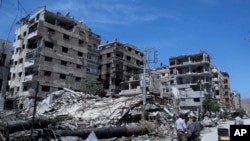In 2013, the Assad regime released deadly sarin gas on Syrian civilians in the Ghouta district of Damascus. More than 1400 people, many of them children, were killed. A month later, after an international chorus of condemnation and outrage, Syria joined the Chemical Weapons Convention and pledged not only to never use chemical weapons, but also committed to the prohibition on their development, production, stockpiling and transfer.
Tragically, as U.S. UN Alternative Representative Robert Wood pointed out at a recent Security Council briefing, “For the past decade, multiple – I repeat multiple - independent investigations have concluded the Assad regime repeatedly used chemical weapons against its own people.”
“Still, the Assad regime has yet to fully account for or destroy its chemical weapons arsenal, nor has it accepted responsibility for the atrocities these weapons caused,” he said.
For this reason, the United States welcomes the ongoing work of the Organization for the Prohibition of Chemical Weapons, the OPCW, which is the implementation arm of the Chemical Weapons Convention. The OPCW continues to investigate Syria’s residual chemical weapons capabilities, in the face, as Ambassador Wood noted, of the Assad regime’s “continued obfuscation.”
“The United States has long been concerned the Syrian regime retains residual chemical weapons capability. And indeed, the OPCW continues to uncover new alarming evidence,” he said. “Last month, the Director General reminded OPCW States Parties of the presence of unexpected chemicals in samples collected by the Declaration Assessment Team between 2021 and 2023 across several declared sites. Such results clearly demonstrated the Assad regime has neither declared nor accounted for the full history and scope of its chemical weapons program.”
Ambassador Wood praised the decision by the OPCW Conference of States recommending that States Parties take “collective measures” to prevent the transfer to Syria of dual-use chemicals and equipment.
“This decision also aims to prevent the same dual-use chemicals and equipment from falling into the hands of non-state actors, including terrorist groups,” he said.
“The United States,” Ambassador Wood declared, “will continue working with partners across the world to bring an end to the regime’s chemical weapons program and promote accountability for the use of chemical weapons in Syria and elsewhere.”














